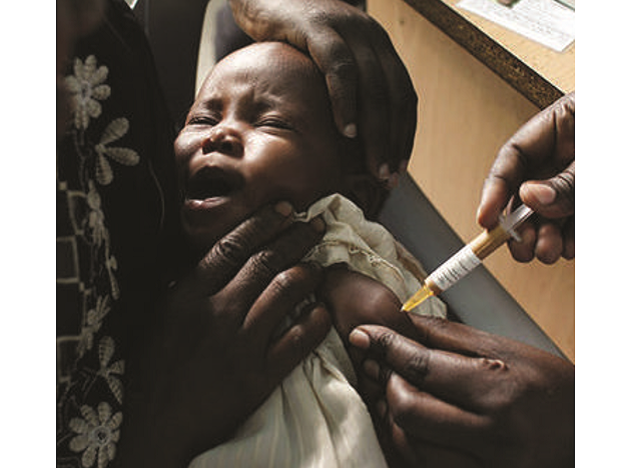
Children aged five to 17 months old in Kenya, Ghana, Malawi to test it
Ghana, Kenya and Malawi have been chosen to test the world’s first malaria vaccine through a pilot program beginning next year, the World Health Organization (WHO) announced on April 24.
The vaccine, which has partial effectiveness and will first be used on children, has the potential to save tens of thousands of lives if used with existing measures, the WHO regional director for Africa, Dr. Matshidiso Moeti, said in a statement. The challenge is whether impoverished countries can deliver the required four doses of the vaccine for each child.
Malaria infects more than 200 million people worldwide every year and kills about half a million, most of them children in Africa. Bed netting and insecticides are the chief protection.
Sub-Saharan Africa is hardest hit by the disease, with about 90 percent of the world’s cases in 2015. Malaria spreads when a mosquito bites someone already infected, sucks up blood and parasites, and then bites another person.
A global effort to counter malaria has led to a 62 percent cut in deaths between 2000 and 2015, WHO said. But the U.N. agency has said in the past that such estimates are based mostly on modeling and that data is so bad for 31 countries in Africa — including those believed to have the worst outbreaks — that it couldn’t tell if cases have been rising or falling in the last 15 years.
The vaccine will be tested on children five to 17 months old to see whether its protective effects shown so far in clinical trials can hold up under real-life conditions. The vaccine has taken decades of work and hundreds of millions of dollars to develop.
Kenya, Ghana and Malawi were chosen for the vaccine pilot because all have strong prevention and vaccination programs but continue to have high numbers of malaria cases, WHO said. The countries will deliver the vaccine through their existing vaccination programs.
WHO is hoping to wipe out malaria by 2040 despite increasing resistance problems to both drugs and insecticides used to kill mosquitoes.
The malaria vaccine has been developed by pharmaceutical company GlaxoSmithKline, and the $49 million for the first phase of the pilot is being funded by the global vaccine alliance GAVI, UNITAID and Global Fund to Fight AIDS, Tuberculosis and Malaria.
A recent report titled `Global Malaria Vaccines Market’ published by Coherent Market Insights says the market is pegged to be valued at US$ 8.5 million in 2018 and is projected to expand at a CAGR of 102.8% during the forecast period (2018-2024).
The report looked at the vaccine market by vaccines Type (Pre-Erythrocytic Vaccine, Erythrocytic Vaccine, Multi-antigen Vaccine), agent (Plasmodium Falciparum, Plasmodium Vivax), distribution Channel (Hospitals, Clinics, Community Centers), and geography.
It said the rise in demand for vaccines for important indications on the backdrop of increasing focus on biological preparations is expected to be a major factor driving growth of the global malaria vaccines market over the foreseeable future.
It noted that since the problem of malaria is burdening many of the emerging and under developed regions such as in Africa and Asia Pacific, various initiatives have been implemented in these regions to drive down high costs of the vaccine in development.
For instance, in 2016, GSK announced plans to develop vaccines at a mere profit margin of 5% of the cost of the vaccine and governments across most regions are actively involved in programs aimed at eliminating malaria.
The Uganda government recently announced a programme codenamed Malaria Action Programme for Districts (MAPD) aimed at kicking malaria out of Uganda. The US$41.4 million programme is funded by USAID Centre for Disease Control (CDC) and UKAID will target 45 districts and will be implemented by the gvernment through the Ministry of Health in partnership with National Malaria Consortium. The 5-year programme targets 13 million of Uganda’s estimated 38 million people.
****
editor@independent.co.ug
 The Independent Uganda: You get the Truth we Pay the Price
The Independent Uganda: You get the Truth we Pay the Price



